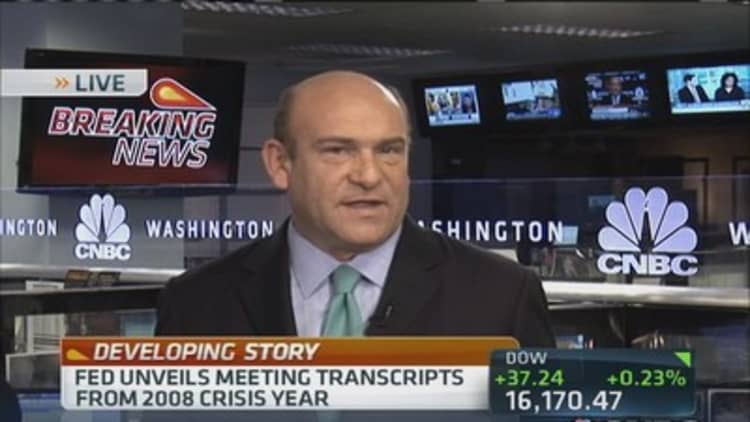The leaders of the Senate Banking Committee on Tuesday announced an agreement on legislation to wind down government-owned mortgage financiers Fannie Mae and Freddie Mac, jump-starting a long-standing debate that could still take years to resolve.
Shares of both financiers fell sharply after the announcement. Fannie's shares were down nearly 25 percent in late afternoon trading. See what Fannie shares are doing now and see the latest updates on Freddie shares here.
Committee Chairman Tim Johnson, a Democrat, and Senator Mike Crapo, the panel's top Republican, outlined the plan in bullet point format after months of talks that included input from the Obama administration. They said they intended to introduce a bill soon, with an eye to having the panel vote on it within weeks.
(Read more: UniCredit to 'focus on growth' after shock loss)
Fannie Mae and Freddie Mac, which own or guarantee 60 percent of all U.S. home loans, provide a steady source of mortgage funds by buying loans from lenders and packaging them into securities they sell to investors with a guarantee.
Their central role in the mortgage market led the government to bail them out to the tune of $187.5 billion in the midst of the 2007-2009 financial crisis, and lawmakers want to make sure taxpayers are never on the hook again.
Under the outline from Johnson and Crapo, private interests would take the first 10 percent of any mortgage losses, before an industry-financed government backstop would kick in.
"This agreement moves us closer to ending the five-year status quo and beginning the wind down of Fannie and Freddie, while protecting taxpayers," Crapo said in a statement.
(Read more: Co-Op Group CEO resigns)
Analysts cautioned, however, that the lawmakers face an uphill battle in trying to enact legislation this year. Any bill that clears the Democrat-led Senate would have to win approval in the Republican-controlled House of Representatives, where some lawmakers want a fully private system.
"This is another step towards reform, but we are still years away from having either the legislative capacity or market willingness to embrace a new mortgage finance system," said Isaac Boltansky, a policy analyst with Compass Point Research and Trading.
Under the proposal, Fannie Mae and Freddie Mac would be wound down and replaced with a new government reinsurer called the Federal Mortgage Insurance Corp. The new entity, which would be funded by user fees, would issue a federal guarantee for mortgage bonds that would kick in only after private creditors had taken a hit.
Included in the outline is a mandate that strong loan underwriting standards be built into the new system.

It would also require a 5 percent downpayment for all but first-time buyers, although that requirement would be phased-in over time. Some consumer and housing advocates worry that a system with rigid downpayments will prevent less affluent Americans from accessing credit.
"There is near unanimous agreement that our current housing finance system is not sustainable in the long term and reform is necessary to help strengthen and stabilize the economy," said Johnson. "This bipartisan effort will provide the market the certainty it needs.
(Read more: China faces delicate policy dance on shadow banking)
Fannie Mae and Freddie Mac play a huge role in keeping borrowing costs low for homeowners, and the guarantees they provide investors are the main reason Americans are able to secure 30-year fixed-rate mortgages.
Whether enough private capital would flow into the market to fully replace their footprint is uncertain. Some analysts said placing more of the burden of losses on private investors would lead to a shrinking of the $10 trillion U.S. mortgage market.
"The Johnson-Crapo bill means a redesigned, smaller U.S. mortgage market because it takes a tough stand on taxpayer protection," said Karen Shaw Petrou, managing partner of Federal Financial Analytics.
The outline from the two senators said they plan to eliminate affordable housing goals that Congress had given Fannie Mae and Freddie Mac. Instead, they would establish housing-related funds to ensure the availability of affordable rental properties. These funds would be financed through a user fee on lenders that seek government backing for their loans.
To ensure community banks are not squeezed out of the system, the senators said they would seek to establish a "mutual cooperative jointly owned by small lenders" to offer a cash window for eligible loans while allowing the institutions to retain mortgage servicing rights.
Fannie Mae and Freddie Mac were seized by regulators in 2008 as loan defaults drove them toward insolvency. But they have since returned to profitability and have returned $202.9 billion in dividends to the U.S. Treasury for the controlling stake the government took when it bailed them out.
Private shareholders, including Perry Capital and Fairholme Capital Management, have sued the United States over bailout terms that prevent the companies from using their profits to buy back the government's shares.
Johnson and Crapo did not outline how they believed these private shareholders should be handled. The preferred shares of the two companies, which have been trading at their highest levels since 2008, fell sharply on Tuesday.
—By Reuters

